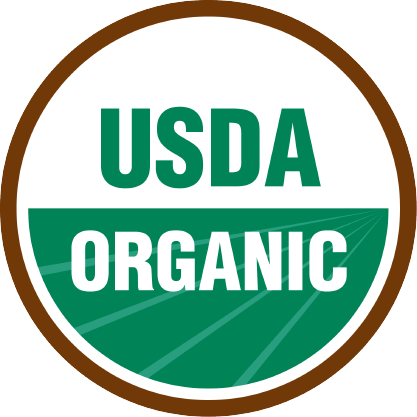Based on this picture, do organic farms typically use monoculture or polyculture?

http://prn.fm/wpcontent/uploads/2015/03/organic-farm-go-organic.jpg
Organic farms use polyculture (poly- = "many"), so they grow multiple types of crops.
True or false: Conventional farms can use synthetic pesticides and fertilizers.
True, this is a major difference from organic farms.
Based on this picture, do industrialized farms typically use monoculture or polyculture?

http://cdn7.whiskeyriff.com/wpcontent/uploads/2016/07/corn-field.jpg
Industrialized farms typically use monoculture (mono = "one"), so they primarily grow one type of crop. Why might this be?
What does the acronym GMO stand for?
GMO stands for "Genetically Modified Organism".
True or false: Organic farms cannot use pesticides or fertilizers
False, organic farms can use natural pesticides (like copper & sulfur) and natural fertilizers (such as manure & compost).
Order these farm types [Conventional, Organic, Industrial] from greatest to least by typical crop yield?
Answer: Industrial, Conventional, Organic
Industrialized agriculture relies on technological innovation to improve crop yields. What is one example of a technology that industrial farmers can use to increase their crop outputs?
Possible answers include: soil sensors to measure water content, mechanical harvesters, drones to monitor crop production, variable rate fertilizer applicators, etc.
What are two of the top four most commonly grown GMOs? A) Wheat & Barley B)Soybeans & Corn C) Tomatoes & Peppers D)Strawberries & blueberries
Answer: B) Soybeans & Corn
True or false: GMOs can be used in Organic Products.

https://www.usda.gov/sites/default/files/Organic%20Seal%20-%20small.png
False, the use of genetic engineering is prohibited in the production of organic food.
True or false: Conventional agriculture often achieves its goal of maximizing crop yield by using GMOs.
Answer: True
About how many acres of land is planted with corn in the US?
A) 250,000 B) 600,000 C) 2,000,000 D)900,000,000
Answer D) The US has 90 million acres of land planted with corn, which is used for many food and industrial products (such as fuel ethanol).
What are two examples of traits that are usually introduced into genetically engineered species?

Answers include: Resistance to a certain pest, disease resistance, delay of spoiling, or resistance to chemical treatments, increased nutrient profile
What is one practice that organic farms use that increase soil health/quality?
Possible answers: Crop rotation, minimal tillage, natural fertilizer, etc.
A study comparing yields of organic and conventional farming from over found that organic farming yields equate to what percentage of the average yield from conventional farming production.
A)25% B)50% C)75% D) 95%
Answer: C) 75%
Most of industrialized agriculture's crop harvest is not directly eaten by humans. What is it used for?
Most of the crops grown on industrialized farms goes to feeding livestock.
What percentage of the North American food supply contains GMOs? A)10% B)25% C)80% D)60%
Answer: C) 80%
What percentage of U.S. total farmland is certified organic cropland and pasture? A) Less than 1% B)15% C) 20% D)35%
Answer: A) In 2011, certified organic cropland and pasture only accounted for 0.6% of the nation's total cropland.
In conventional agriculture, farmers will typically designate entire fields to just one crop. Name one benefit and one cost of this type of system.
Benefits include: reducing labor costs, making harvesting easier, allowing uniform irrigation, etc. Costs include: Reduced biodiversity, susceptibility to pathogens, etc.
Why do industrialized farms need to use so much fertilizer? (Hint: think about soil quality & how this type of farm grows crops)
Answer: Fertilizers are needed because growing the same crop in the same field each year depletes the nutrients that the plants need to grow, so the nutrients have to be replenished somehow.
Which company is the largest biotech company in the world, supplying the majority of GMO crop seeds? A) Nestle B)Tyson C) Unilever D)Monsanto
Answer: Monsanto